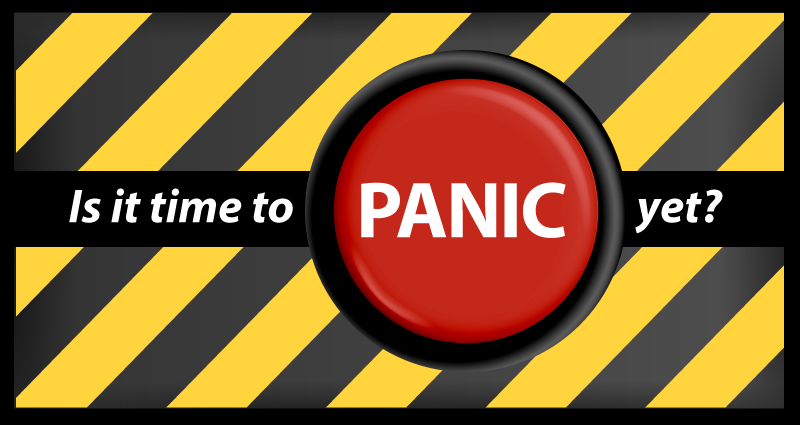
It’s a Tech Takeover! Everybody panic!
Google is doing checking accounts! Apple has a credit card! Walmart has both! It’s a Tech Takeover!! (Cue EVERYBODY-PANIC.gif)
Everyone has been predicting a tech/retail giant takeover of personal banking, specifically checking or “transaction” accounts, for a while, but… is it really time to panic? Or can we panic later?
What’s the right level of panic here?
So far, everything mostly seems to be a label slapped onto a megabank product.
The Apple Card is basically a really pretty Goldman Sachs card. It’s not really clear why it exists other than to look and sound cool (titanium makes a neat metallic “clunk” sound if you drop it.) Of course the Apple Card isn’t the only thing Goldman Sachs Bank ($933B) offers, from their own banking products branded as Marcus, to a Clarity Money app.
Amazon might not have an official bank presence in the U.S., but they are building components around the world: Amazon Pay (digital wallet and debit cards), Amazon Go (No checkout shopping), Amazon Cash (turn cash into gift cards), Amazon Lending (to its merchants), even Amazon Protect (insurance).
Google is slapping the big G on a checking product (code-named “Cache”) using a Citibank/Stanford FCU mashup. Stanford FCU‘s ($3B) involvement is interesting; they get to make a stronger connection to their members who work at Google, and open up to an even larger field of membership. Citibank’s ($300B) interest is obvious. And Google will boost their Google Pay product and get another data source beyond search, including data on people’s income and spending on bills.
Walmart’s GoBank is tied into Green Dot Bank. They are doing some neat things (such as MoneyCards – prepaid debit cards) to target the “unbanked” (things that CUs probably should be doing more, frankly).
Remember when people thought we’d be using Facebook apps to do online banking? Facebook’s past dabbles into financial services have not worked out well, and it’s looking like the whole “we’ll just invent our own currency (Libra)” thing is crashing and burning. Facebook will be around for millennia, but they’re a long way from being trusted with money.
Same for PayPal; you sort of have to interact with them to lead a modern life, but many people don’t quite trust them. PayPal ($43B) looks and quacks a lot like a bank, but has very studiously avoided actually being a bank. The PayPal credit card is a branded card issued through banks like The Bancorp Bank ($4B) and Synchrony Bank ($107B).
Intuit may be even better at the game. Between Quicken with their Simplifi app, Mint, Turbotax, Quickbooks, and Rocket Mortgage (“The Largest Home Lender in America”), it certainly looks like Intuit is collecting a lot of financial data and making a lot of loans outside of the traditional banking industry. Quicken Loan’s list of companies and affiliations is pretty eye-opening as well.
No one else seems to be doing personal banking right. Yet.
Personal banking (or at least running checking or “transaction” accounts) is really hard, and not all that profitable (or unprofitable) compared to loans or other things tech companies could be doing.
Banks and credit unions still have most of the expertise in transactions, and still have the advantage of a full package of products and processes for all the stuff that makes daily life go.
For now.
Sooner or later, one of the tech giants will get it right.
Is having a one-stop local shop for financial products the “killer app” for traditional banks and CUs? Maybe not for much longer.
When one of the tech giants finally decides to get serious about owning the ENTIRE flow of consumer money and spending (not just relabeling bank products), we’ll see some major disruption.
Imagine a future where your members switch their Direct Deposits to an Amazon transaction account (at some point, the term “checking account” is going to get replaced) because they get a small bonus to their Amazon balance. Ponder your data on the volume of checking and card transactions that already flow to AMZN. What will be your answer to that?
It’s not time for despair or panic.
Credit unions will always have some unique, distinct advantages. You’re local and you’re part of your members’ lives in a way a remote giant corporation never could be.
But it is time to innovate.
It’s time for “vigorous, decisive action”. It’s time to communicate and connect. And it’s up to marketers to blast out of their silos and lead the charge.
- CU Numbers Need Marketing Love, Too - April 2, 2024
- Will it blend? The only CU fintech question that matters. - February 13, 2024
- Solving the CU marketing “now what?” problem - January 16, 2024
